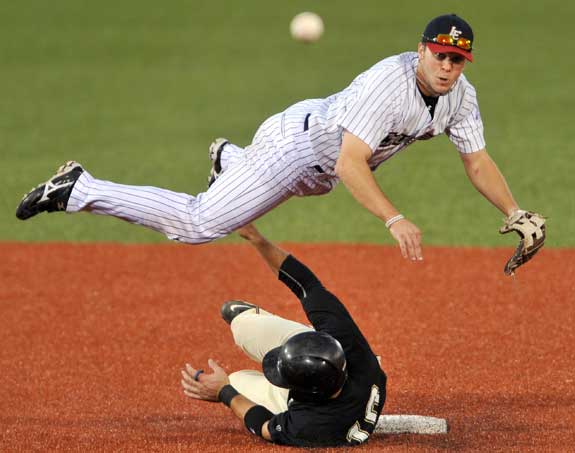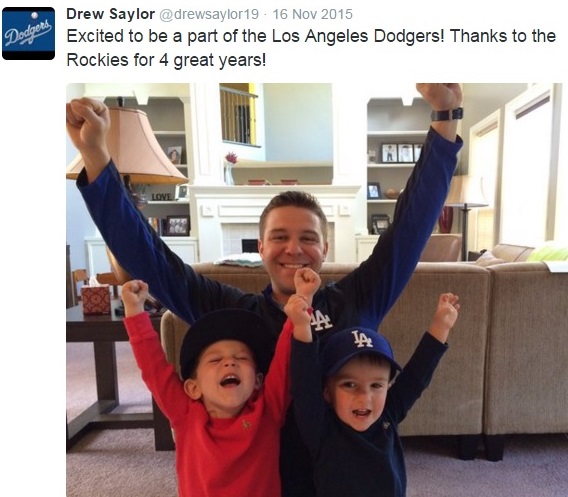On December 21, 2015 the Dodgers announced their minor league managers for the upcoming season. There were three new faces among the group including 32-year old Drew Saylor who takes over the reins of the Rancho Cucamonga Quakes of the Class A+ California League.
Saylor – born in Barberton, Ohio – became a Wadsworth High School Grizzly in his freshman year when his family relocated to Wadsworth. A small city with a population of about 22,000 Wadsworth is located in the northeastern part of the state about 37 miles from Cleveland.
At Wadsworth High he was a two-time Medina County Player of the Year and earned all-league honors four times. In 2002 he was selected as the Ohio Division I Player of the Year and holds a number of all time records at Wadsworth including most runs scored, most hits, most runs batted in and most walks.
Perhaps his coaching philosophy started to take shape during his playing time as a Grizzly. Saylor said that baseball and his father taught him a few other things about his hometown. He was a field rat and learned how to play the game and relate to people by watching his father.
“It’s about the relationships you build,” Saylor said. “When I think about the Wadsworth community, that’s what it’s all about. It’s a tight-knit community where people pull for each other and where the community backs you. That’s what I miss.”

A standout second baseman at Wadsworth High School and with the Lake Erie Crushers, Saylor was inducted into the Medina County Sports Hall of Fame in 2012.
Photo credit – David Richard)
After his graduation from high school Saylor headed off to the University of Cincinnati for two years then transferred to Kent State University in his junior year. He indicates that he found the right fit at Kent and his baseball career got back on track when he went on to earn first-team All-League honors in 2006 and won the conference batting title. He was also a semi-finalist for the Brookes Wallace Award for best overall player.
Saylor’s hard work was rewarded when he was selected by the Miami Marlins in the 13th round of the 2006 First year player Draft. He played one year in the New York-Penn League with the Jamestown Jammers and in 2007 he joined the Houston Astros organization hitting .286 with the Greenville Astros in the Appalachian League.
For the next three years the six foot, 195-pound second baseman played in the Independent Frontier League. His best season was with the Lake Erie Crushers in 2009 when he hit .302 with 70 runs, 26 doubles, 10 homers and 62 runs batted in, helping the Crushers claim the Frontier League title. He was selected as the 2010 recipient of the Fran Riordan Citizenship Award for his work in the community and for serving as a volunteer assistant coach for Cleveland State.
Drew Saylor’s last season as a minor league player came in 2010 with the Crushers when his career headed in a different direction. He actually had started in that direction as far back as October 2009 when he became a volunteer assistant coach with Cleveland State University where he helped coach the Vikings to school records in doubles and outfield fielding percentage.
In 2011 Saylor served as a volunteer assistant coach with the University of Akron where he coached his brother Scott. Then, with the support and encouragement of his wife Amanda, Saylor took the next step in returning to what he loved to do – communicate, teach and be involved with the game in a different capacity.
He sent out resumes to MLB clubs and received replies from Pittsburgh, Colorado, Cleveland, Detroit, Kansas City and Cincinnati. After a lengthy interview he was hired by the Colorado Rockies and spent the next four years in the Rockies system serving as the hitting coach with the Grand Junction Rockies in 2012. In 2013 he was elevated to the position of manager of the Tri-City Dust Devils in the short-season Class A Northwest League. In his first year as a manager at age 29, he was the youngest manager in all professional baseball. He held that position again in 2014 and in 2015 moved to the Modesto Nuts of the High-A California League as hitting coach.
Saylor very quickly had the opportunity to put his coaching philosophy to work in his first season with the Tri-City Dust Devils when the team won only six of their first 23 games. Rather than get down on the situation, he used it as a teaching lesson. Well aware that it is a team game played on the field, he made a point with his team. When playing the game as a team venture, the individual can only benefit and help himself get better.
“It’s funny, in pro baseball the perception is that it is all about the individual, so I had to let us fail,” Saylor said. “I had to let them see the way we were going wasn’t the right way. I told them that they were playing selfish. We weren’t focused on what was important, which is for each of them to find a way to help us win.”
It appears that his message worked, as his team responded with a 19-9 run to finish out the first half of the season.
Drew Saylor is listed as a Minor League Manager and hence a coach. I expect regardless of his position in baseball he will never stop being a coach. And while we may see him as a coach, he sees himself as a teacher with a baseball field as his classroom.
“You’re doing the bare basics of what teaching is,” said Saylor. “You’re taking an idea out of your head and conveying that knowledge to a pupil and that pupil has to put that idea into practice. There’s not a difference in how I teach, the way that I teach changes with players. Some players speak Spanish, I have to speak Spanish. Some players are visual learners, I have to show them what to do.”
So what kind of a teacher is he?
“I’m a very laid-back, players’ manager,” he said. “The only thing I get upset about is players disrespecting themselves or our game or their family, and that includes their teammates. If they do any of those things, that’s when they’re going to have me jump their butts and embarrass them.”
Part of his methodology not only includes going all out all of the time but but gives also gives young players a safeguard if they make mistakes.
“On the field I want them to try different things and not be afraid to make mistakes,”Saylor said. “I want them to get dirty. I want them to be giving 100 percent effort.”
Drew Saylor’s mantra can be summed up in two words as he teaches young players to meet the challenges of minor league baseball – “Know Thyself.”
As I transitioned from playing into teaching – I’m not a big fan of calling what I do coaching – ‘Know Thyself’ became my teaching philosophy, said Saylor. “Players needed to know themselves so well that they could accept coaching and apply to their specific situation. One main way I did that was to teach the answer to the question ‘why?'”
In a post to Dodgers Player Development Director Gage Kapler’s blog, Saylor wrote about his philosophy of coaching – that is teaching – and where he stands in line as a manager of a baseball team:
“I learned that in order to lead and help others become the best they could be, I had to serve. As a leader, I needed to be the last man in line.”
In a November 2013 podcast interview with Baseball PhD’s Ed Kasputis and Dave Matejczyk, Saylor was asked what three leadership lessons he had learned during his first year as a minor league manager. He quickly responded:
- Be precise with planning,
- Continue to have empathy and compassion for players. Watch body language to see what is going on in their body versus what they are saying,
- The energy I brought needs to continue as kids feed on what leaders do (Saylor sprints out to the third base coaching box).
Pleased to now be in the Dodger organization and grateful to the Rockies for four “great years” Drew Saylor also has his dream.
“My big dream would be to be in the big leagues at some point, but if I have a career in player development at the lower levels, I wouldn’t be disappointed at all,” Saylor said. “That’s where you have the most impact on kids.”

After learning that he had been hired by the Dodgers to manage the California League Champion Rancho Cucamonga Quakes, Saylor posted this on Twitter.
(Image courtesy of @drewsSaylor19)
It should most definitely be interesting in LoanMart Field to watch his dream unfold – along with the dreams of the youngsters under his tutelage.




 March 4th, 2016 at 9:00 am
March 4th, 2016 at 9:00 am  by Harold Uhlman
by Harold Uhlman  Posted in
Posted in 

Great piece, Harold. Looking forward to meeting Drew at ST and watching him all season at Rancho.
Drew sounds like he is in a perfect spot to help mold the young prospects. I would not wish anyone not to be able to reach their goal, but it sure seems he is a natural for player development, and that is where High A really starts to take hold. Once you get into AA, the competition gets real, and the non-prospects start to drop. If they do not have the confidence going into AA, or the ability to adapt to a team concept, it will be difficult to learn it at that level. I am looking forward to seeing which prospects get to Rancho, and how Drew will develop them.
I think Drew really gets it as he has lived what the youngsters go through and came out smiling. I think he really understands that managing and coaching are much more than just dealing with how the players perform on the field. I love his thought that the baseball field is his classroom.